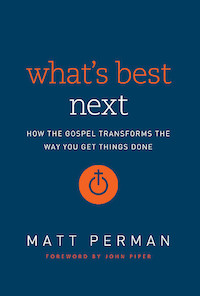Latest
-
Objections to the Christian Faith from the Unchurched and De-Churched
 Tue Dec 02, 2014
Tue Dec 02, 2014
by Resurgence -
Craig Groeschel: We Innovate for Jesus
 Tue Oct 14, 2014
Tue Oct 14, 2014
by Resurgence -
Mark Driscoll: Revelation
 Tue Oct 07, 2014
Tue Oct 07, 2014
by Resurgence -
RESURGENCE LEADERSHIP #034: JOHN PIPER, WHY I TRUST THE SCRIPTURES, PART 2
 Tue Sep 30, 2014
Tue Sep 30, 2014
by Resurgence -
Resurgence Leadership #033: John Piper, Why I Trust the Scriptures, Part 1
 Tue Sep 23, 2014
Tue Sep 23, 2014
by Resurgence

Archives
Gospel-Driven Productivity: A Q&A with Matt Perman

Why should Christians care about productivity? Does Jesus want us to be productive? Get answers to these questions and more in this Q&A with the author of a recent book on gospel-motivated productivity.
Editor’s note: Matt Perman is the former senior director of strategy for Desiring God Ministries and a frequent speaker and writer on issues of leadership and productivity. He recently wrote a book called What’s Best Next: How the Gospel Transforms the Way You Get Things Done, with a foreword by John Piper. In this post, Mars Hill Church’s Leadership Development Manager Joe Stengele interviews Matt about the motivation and message of his new book.
Joe Stengele: At Mars Hill, we like to say, “It’s all about Jesus.” How is productivity all about Jesus?
Matt Perman: At first it might be hard to see how productivity is about Jesus, because so much productivity thinking looks at things simply from a secular perspective. What do calendars, to-do lists, and cool moleskine journals have to do with Jesus?
But, of course, they have everything to do with him, for “all things were created by him and for him” (Col. 1:16). All of our productivity practices and all of the cool productivity tools out there ultimately exist for the glory of Jesus Christ. That means they are to be used to bring honor to his name. Productivity is about Jesus because glorifying him is the ultimate purpose of all that we are doing when we are being productive.
What do calendars, to-do lists, and cool moleskine journals have to do with Jesus?
This is even evident if you look at things from a secular perspective. For example, lots of productivity books talk about accomplishing “what matters most.” But God is what matters most! Hence, if we truly want to be productive, we have no choice but to think about this in relation to God. Otherwise we are abstracting productivity from its ultimate goal and thus not truly accomplishing “what matters most.”
JS: I appreciated your section on Gospel-Driven Productivity in the book. How does the gospel motivate us to get things done?
MP: The gospel both saves us and, once we are saved, gives us the wisdom by which we are to live. This is why the New Testament consistently roots the Christian ethic in the cross of Christ. Christian giving (2 Cor. 8:9), Christian leadership (Matt. 20:25–28), and Christian behavior in general (Phil. 2:3–11; Rom. 15:2–3) are all rooted in Christ’s example of putting us before his own interests, even to the point of death on a cross, that we might be saved.
This means that, first of all, the gospel changes our motive in getting things done. The goal of our productivity should not be first of all our own personal peace and affluence, as some otherwise very helpful books like Tim Ferriss’ The 4-Hour Workweek make it. Instead, the goal of our productivity should be to bring benefit to others—to make a contribution and make life better for people, even to the point of sacrificing ourselves and own interests if necessary, to the glory of God.
All of our productivity practices and all of the cool productivity tools out there ultimately exist for the glory of Jesus Christ.
Second of all, the gospel changes the means through which we become productive. The key to being productive is not to put yourself first, but rather, like Jesus, to be generous and put the other person first. Look at things from the other person’s point of view, and do the things that meet their needs. That’s what it really means to be productive. The cross means that we need to have a radically other-centered view of our productivity.
Third, the gospel is the power source of our productivity. By realizing that we are accepted by God apart from our good works (that is, apart from our productivity), the pressure is off. We are free to be productive for the good of others because we want to, not because we are compelled, constrained, or forced to. This unlocks the true power source of maximum productivity: love.
JS: You say, “Don’t prioritize your schedule; schedule your priorities.” What does this mean?
MP: So often when we are planning our days or weeks, we just take the things that are in front of us, prioritize those, and think that’s our work. But that’s really just prioritizing the urgent. What we need to do is prioritize the important. And the important things might not even be on our calendar yet or in our email.
Urgent things press upon us; important things often don’t press upon us. That’s why they are so hard to do. They require us to take initiative and be proactive. Being able to do this is the essence of being a mature person, and shows why personal leadership and character are actually at the heart of true productivity.
The goal of our productivity should be to bring benefit to others—to make a contribution and make life better for people.
This means that we shouldn’t first ask, “What things are vying for my attention, and how do I organize them?” Instead, we should first ask, “What things are most important for me to be doing, and how do I make sure that I am able to move ahead on them?” The former is reactive, while the latter is proactive.
JS: You spoke with many Christian leaders about the importance of productivity, including Mars Hill’s own Bubba Jennings. Whose answers most influenced your own life?
MP: I loved interviewing Bubba. He had so many helpful insights it was incredible. One of the most important things he talked about was the importance of theologically informed values.
Lots of time-management literature talks about the importance of values. But, as Bubba pointed out, there is actually something that comes underneath our values—namely, God’s truth. That is theology. So as Christians, we need to make sure we not only have our values clarified, but that we have the right values in the first place. And this means having theologically-informed values.
Also super helpful was Mike Allen, chief White House correspondent at Politico. He talked about how service is the key to productivity. I loved that, because that’s at the heart of the book. To make serving others your mode of operation is not only right in itself, but also benefits you because that’s exactly the kind of employee people like to promote—namely, those who are proactive in making good things happen for others, rather than just seeking their own narrow interests.
We are free to be productive for the good of others because we want to, not because we are compelled, constrained, or forced to.
JS: What’s one key productivity tool you recommend to all leaders?
MP: Definitely a moleskine journal. Even if you are almost entirely electronic, there are still times you need to write things down. Having a capture tool that has good style to it makes you want to use it more, just because it’s fun to use. And the best capture tool in this regard is the moleskine journal.
JS: You reference William Wilberforce often, among others. Why is he someone you look to as living a productive life?
MP: Wilberforce is the great evangelical social reformer from the late 1700s and early 1800s who put an end to the slave trade in the British Empire. He is one of my heroes, and a hero of the book, because he embodies the true meaning of a productive life—doing good for others creatively, competently, and abundantly.
One of his biographers said he “lived to do good” and that he “lacked time for half the good works in his mind.” He was always planning and implementing initiatives for the good of others. That’s how we are to be as Christians; Christ redeemed us that we would be “zealous for good works” (Titus 2:14), like Wilberforce.
JS: There is not a lot of content available on Christian productivity. Why should Christians live productive lives?
MP: The first answer is obvious, but often overlooked: God commands it. We are told to “make the best use of the time” (Eph. 5:16), use all our gifts and abilities for Jesus (Matt. 25:14–30), and be like the ant that is both self-governing and diligent (Prov. 6:6–8).
The second reason is that living a productive life enables you to do more good for others, which is our ultimate call as Christians (Matt. 5:16). When you are more productive in your work and life, it benefits people. We should seek to do all the good we can, and therefore we should seek to learn about productivity practices so that we can be more abundant in doing the good we are called to do.
Urgent things press upon us; important things often don’t press upon us. That’s why they are so hard to do.
This also means that we should use some of the time we save through our increased productivity to do good for others in ways that go beyond our jobs and daily lives. One of the best ways to do this is to engage in the fight against large global problems, such as extreme poverty, illiteracy, and disease. Because of technology, we can now carry on much of that fight from our living rooms, such as through lending to entrepreneurs in the developing world through Kiva, or encouraging missionaries on Facebook.
This is a much better use of the time we save than just using it to have more fun, yet almost no time-management books make this point. But this is one of the main things I want to say: Use your increased productivity not to pursue more peace and affluence for yourself, but to seek the benefit of others.
As you do that, you will ironically find more peace and joy than you ever imagined: “One gives freely, yet grows all the richer; another withholds what he should give, and only suffers want. Whoever brings blessing will be enriched, and one who waters will himself be watered” (Prov. 11:24).
For more on gospel-driven productivity, check out Matt Perman’s new book What’s Best Next: How the Gospel Transforms the Way You Get Things Done.
